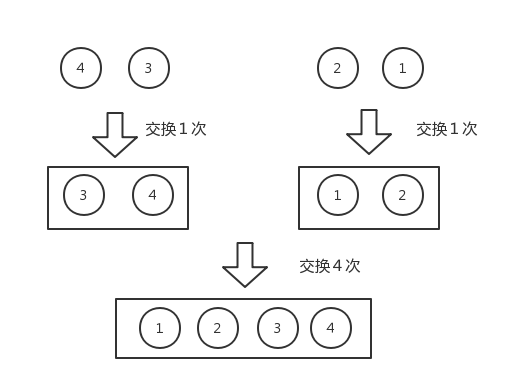Problem Description
你想通过交换两个相邻的序列元素来处理一系列n个不同的整数,直到序列按升序排列。然后它需要多少次。
例如,1 2 3 5 4,我们只需要一个操作:交换5和4。
Input
输入由许多测试用例组成。每种情况由两行组成:第一行包含一个正整数n(n <= 1000); 下一行包含从1到n的n个整数的置换。
Output
对于每一种情况,在独立的一行内输出最少交换的次数。
Sample Input
3
1 2 3
4
4 3 2 1
Sample Output
0
6
最近想找个递归分治的题目练练,就碰到这题。该题要求将一个序列中所有相邻逆序的元素恢复成升序的序列。
方法一
最原始的方法,利用两重循环进行枚举。该算法的时间复杂度为O(n^2),这中没什么好说的,虽简单但是效率比较低,不能通过测试。
import java.util.Scanner;
public class Main {
public static int[] a = new int[10001];
public static long count = 0;
public static void main(String[] args) {
Scanner in = new Scanner(System.in);
while(in.hasNext()) {
int n = in.nextInt();
for (int i = 1; i <= n; i++) {
a[i] = in.nextInt();
}
count = 0;
int i, j;
for(i=0; i<N-1; i++)
for(j=i+1; j<N; j++)
if(a[i]>a[j])
count++;
System.out.println(count);
}
}
}方法二
利用归并排序的思想求解逆序对的个数,这是解决该问题的一种较为高效的算法。该算法的时间复杂度为O(nlogn)。
现在假如n为4,原始序列为4、3、2、1。
过程如下面所示:

左半边是升序的,它与右边某个元素满足逆序,则它后边的元素都与右边的那个元素满足逆序,所以要交换mid-left+1次。(如:4和1,2都满足逆序,要交换两次;同理3也是)
AC代码
import java.util.Scanner;
public class Main {
public static int[] a = new int[10001];
public static int[] b = new int[10001];
public static long count = 0;
public static void main(String[] args) {
Scanner in = new Scanner(System.in);
while(in.hasNext()) {
int n = in.nextInt();
for (int i = 1; i <= n; i++) {
a[i] = in.nextInt();
}
count = 0;
merge(1, n);
System.out.println(count);
}
}
public static void merge(int left,int right){
if(left==right) return;
int mid = (left+right)/2;
merge(left,mid);
merge(mid+1,right);
int i=left,j=mid+1,k=left;
while(i<=mid&&j<=right){
if(a[i]>a[j]){
b[k++] = a[j++];
count += mid-i+1;
}else {
b[k++] = a[i++];
}
}
while(i<=mid) b[k++] = a[i++];
while(j<=right) b[k++] = a[j++];
for(int x=left;x<=right;x++){
a[x]=b[x];
}
}
}





















 470
470

 被折叠的 条评论
为什么被折叠?
被折叠的 条评论
为什么被折叠?








